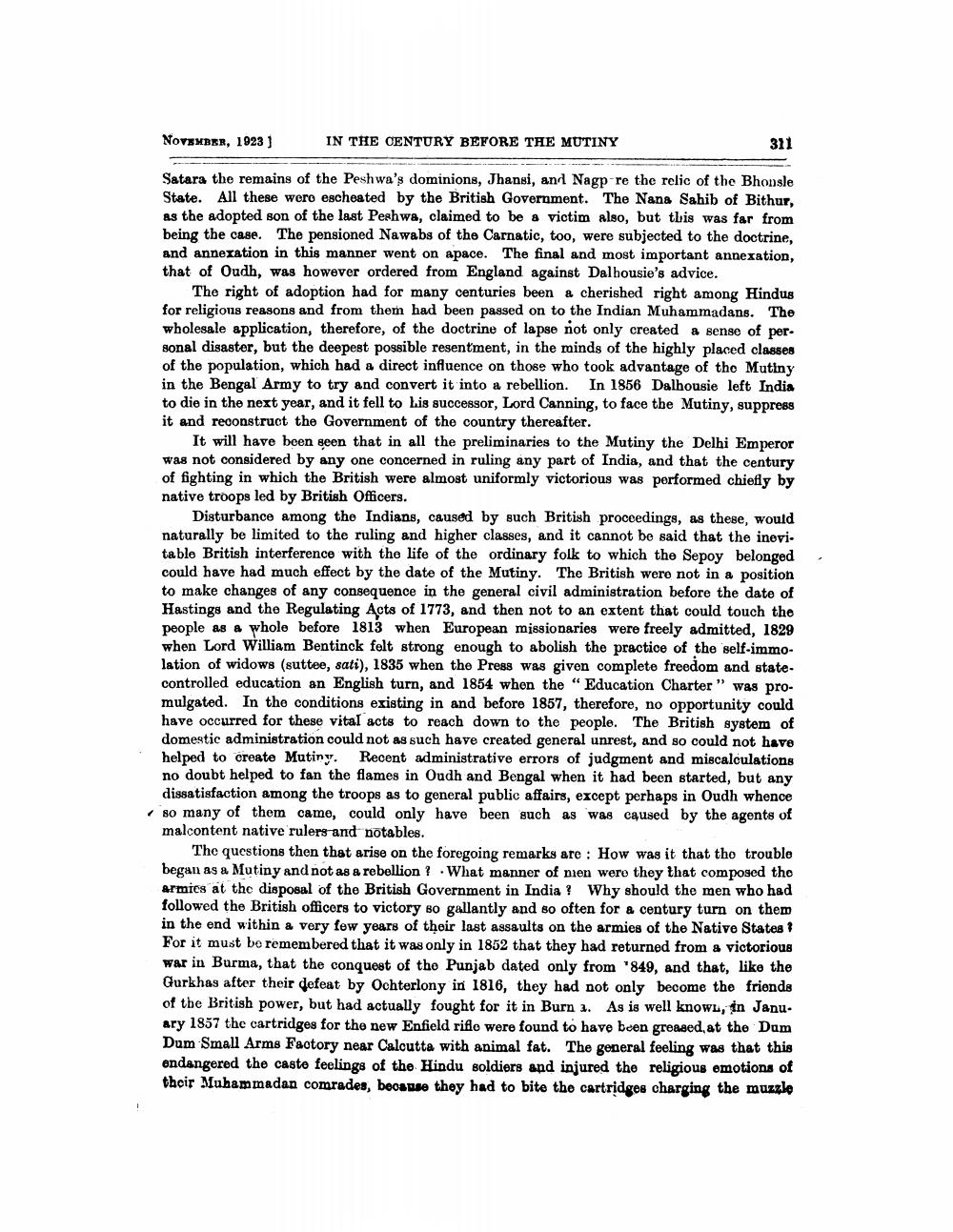________________
NOVEMBER, 1923)
IN THE CENTURY BEFORE THE MUTINY
311
Satara the remains of the Peshwa's dominions, Jhansi, andl Nagp-re the relic of the Bhonsle State. All these woro escheated by the British Government. The Nana Sahib of Bithur, as the adopted son of the last Peshwa, claimed to be a victim also, but this was far from being the case. The pensioned Nawabs of the Carnatic, too, were subjected to the doctrine, and annexation in this manner went on apace. The final and most important annexation, that of Oudh, was however ordered from England against Dalhousie's advice.
The right of adoption had for many centuries been a cherished right among Hindus for religions reasons and from them had been passed on to the Indian Muhammadans. The wholesale application, therefore, of the doctrine of lapse not only created a sense of personal disaster, but the deepest possible resentment, in the minds of the highly placed classes of the population, which had a direct influence on those who took advantage of the Mutiny in the Bengal Army to try and convert it into a rebellion. In 1856 Dalhousie left India to die in the next year, and it fell to his successor, Lord Canning, to face the Mutiny, suppress it and reoonstruct the Government of the country thereafter.
It will have been seen that in all the preliminaries to the Mutiny the Delhi Emperor was not considered by any one concerned in ruling any part of India, and that the century of fighting in which the British were almost uniformly victorious was performed chiefly by native troops led by British Officers.
Disturbance among the Indians, caused by such British proceedings, as these, would naturally be limited to the ruling and higher classes, and it cannot be said that the inevi. table British interference with the life of the ordinary folk to which the Sepoy belonged could have had much effect by the date of the Mutiny. The British were not in a position to make changes of any consequence in the general civil administration before the date of Hastings and the Regulating Acts of 1773, and then not to an extent that could touch the people as a whole before 1813 when European missionaries were freely admitted, 1829 when Lord William Bentinck felt strong enough to abolish the practice of the self-immolation of widows (suttee, sati), 1835 when the Press was given complete freedom and state. controlled education an English turn, and 1854 when the “Education Charter" was promulgated. In the conditions existing in and before 1857, therefore, no opportunity could have occurred for these vital acts to reach down to the people. The British system of domestic administration could not as such have created general unrest, and so could not have helped to create Mutiny. Recent administrative errors of judgment and miscalculations no doubt helped to fan the flames in Oudh and Bengal when it had been started, but any dissatisfaction among the troops as to general public affairs, except perhaps in Oudh whence so many of them came, could only have been such as was caused by the agents of malcontent native rulers and notables.
The questions then that arise on the foregoing remarks are : How was it that the trouble began as a Mutiny and not as a rebellion ? . What manner of men were they that composed the armies at the disposal of the British Government in India? Why should the men who had followed the British officers to victory so gallantly and so often for a century turn on them in the end within a very few years of their last assaults on the armies of the Native States ? For it must be remembered that it was only in 1852 that they had returned from a victorious war in Burma, that the conquest of the Punjab dated only from '849, and that, like the Gurkhas after their defeat by Ochterlony in 1816, they had not only become the friends of the British power, but had actually fought for it in Burna. As is well know, in Janu. ary 1857 the cartridges for the new Enfield rifle were found to have been greased, at the Dam Dum Small Arms Factory near Caloutta with animal fat. The general feeling was that this endangered the casto feelings of the Hindu soldiers and injured the religious emotions of thoir Muhammadan comrades, boonuse they had to bite the cartridges charging the muzzle




